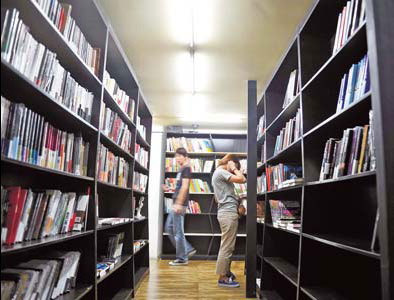Bookstores go offline
Updated: 2011-11-18 10:55
By Yang Guang (China Daily)
|
|||||||||
 |
|
Many bookstores, like this one in Chengdu, struggle to survive. Provided to China Daily |
When Wu Ximan passed by Wudaokou, the commercial hub surrounded by universities in northwest Beijing, in late October, he was surprised to find the bookstore O2SUN he used to frequent had been closed down.
Started in 1995, O2SUN developed from one store in Xiamen, Fujian province, into a nationwide chain with 31 outlets.
"I miss its dark-brown wooden bookshelves, rich coffee aroma and comforting background music," says Wu, a postgraduate student at Tsinghua University.
Sun Chi, founder of O2SUN, confirmed that book sales have sharply declined in the past four years and the store went out of business (temporarily, she claimed) because of serious funding issues.
O2SUN is not alone. More than 10,000 private bookstores have gone bankrupt nationwide since 2007.
Xiao Bao, founder of Shanghai-based Jifeng Bookstore, believes physical bookstores will disappear some time in the next one to five years, if the government doesn't step in to help.
There are three kinds of bookstores in China: State-run bookstores, private bookstores and online bookstores.
Aside from the three pillars of online bookstores - Dangdang.com, Amazon.cn and 360buy.com - newcomers like Suning.com are trying to break in.
Discounts are the ultimate weapons of online bookstores. Suning.com, for instance, initiated a "suicide" promotion when it announced the official launch of its book channel in early November.
The three pillars quickly copied this promotional blitz.
Zhai Defang, deputy manager of Sanlian Bookstore, points to the online bookstore "price wars" as one reason for the failure of O2SUN, in addition to its internal management problems.
Wang Xiaoting, 28, a trainer at Institute of Petroleum Exploration and Development in Beijing, says she frequented O2SUN when she went to college in Xiamen nine years ago.
"Now I buy books at online bookstores most of the time, but I still cherish the feeling of choosing books in bookstores like O2SUN," she says.
Xu Zhiqiang, manager of Trends' Lounge Bookstore, adds that privately run bookstores face unfair competition from State-run bookstores.
"State-run bookstores don't have to pay high rents," he explains. "Besides, they enjoy the benefits of value-added tax refunds and the profits from exclusively issuing school textbooks."
Bai Ye, a researcher with the Chinese Academy of Social Sciences, says he is surprised at the plight of private bookstores, considering the country is striving to develop its cultural industries.
"For healthy development, cultural industries require more support from the government," he says.
According to People's Daily, at a symposium held in June on the future of private bookstores, Yan Xiaohong, deputy director of the General Administration of Press and Publication, said relevant authorities were drawing up policies to reserve the best locations in town for bookstores, in their urban plans.
Besides the construction of large-scale bookstores, Yan says small bookstores should have enough room for growth, in order to balance a city's cultural ecology.
As for O2SUN, Su Xiaodong, deputy director general of the Xiamen Cultural and Creative Industry Association, revealed on Nov 6 that, with the help of local government, a team formed by the association and O2SUN would consult with a dozen companies about investment.











